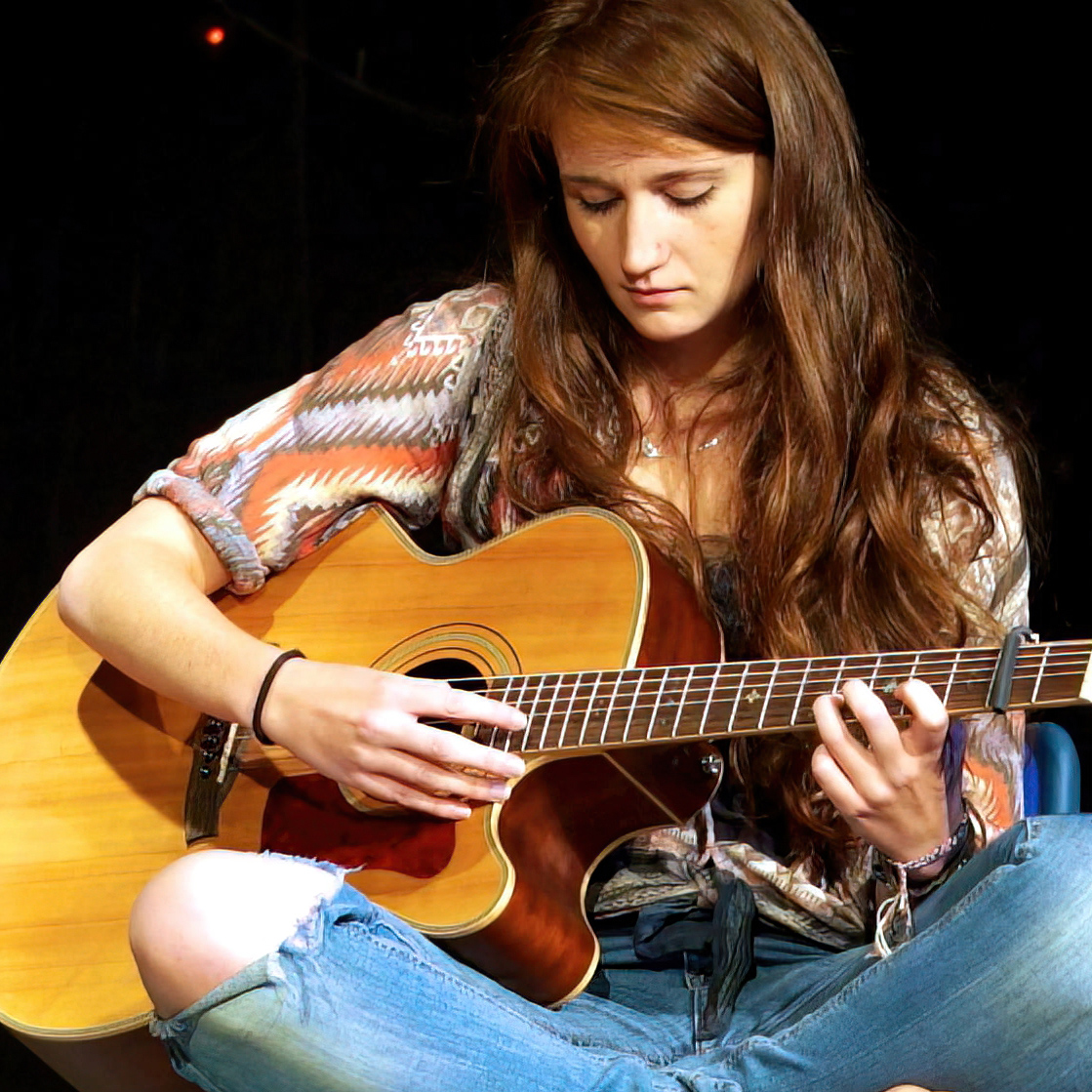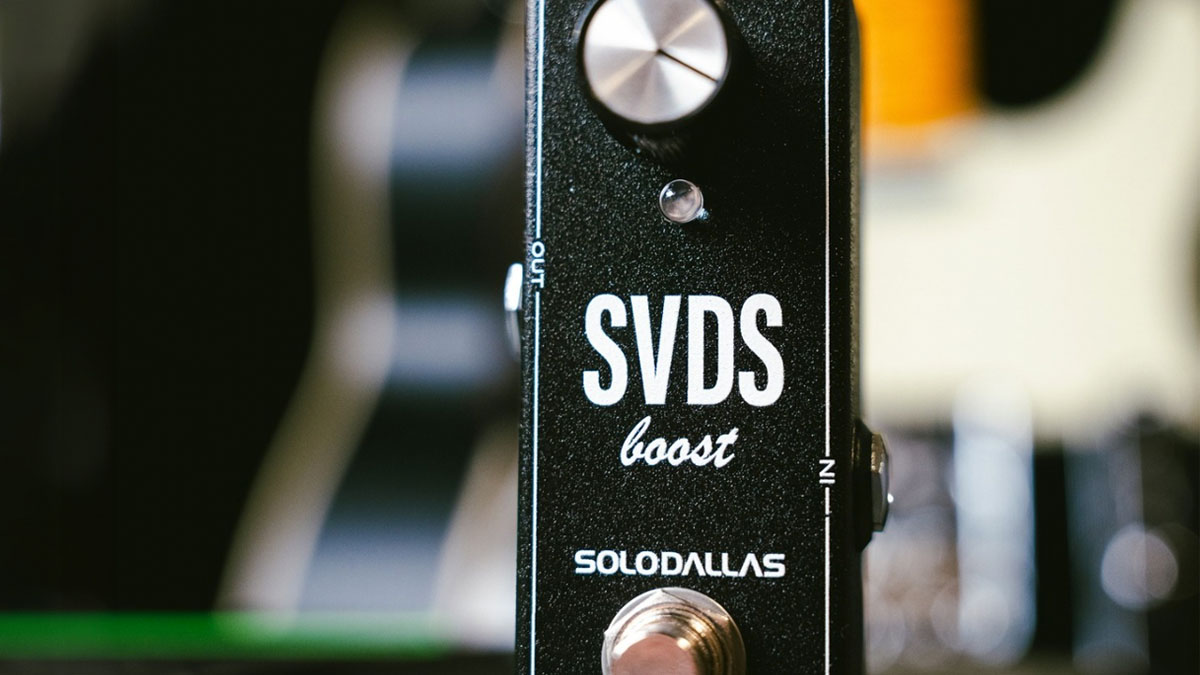How Marissa Paternoster made Screaming Females' explosive new album with a $20 Klon clone, Spoon's Telecaster and a fresh perspective on playing
The alt-rock veterans' leader on recording in the studio that gave birth to Nirvana's In Utero, resisting the urge to over-perform and why nothing beats the G&L she learned to play on

Desire Pathway represents the first album of all-new material to come from New Jersey’s alt-rock underground upstarts-turned-veterans, Screaming Females, in five long years.
The abnormally lengthy pause between 2018’s All At Once and this latest effort was punctuated by a spectacular solo effort from G&L mangling guitarist/frontwoman Marissa Paternoster, a compilation album of singles, B-sides, and covers titled Singles Too, and of course, the small matter of a global shutdown.
“We’ve been in the cycle of writing, recording and touring for our entire existence as a band, so we were just doing what we always do,” explains Paternoster, who dialed in to chat just a few days prior to the album’s release.
But then, like every artist on the planet, she and her bandmates – Jarrett Dougherty (drums) and Mike Abbate (bass) – were forced to stare directly into the face of a full-blown existential crisis.
“Our goal when we were actually in the studio was just to get a record made because everything seemed so precarious,” explains the guitarist, for whom the 17 years she’s spent leading the band now makes up almost half her lifetime.
But Desire Pathway is very much not a lockdown record. Much of its material was written prior to the day the massive viral load hit the fan, in response to what was then a fresh breakup.
Explosive immediacy, freshly charged riffs (see album opener, Brass Bell) and a barrage of frenetic improv’d solos belie the fact that the bulk of the 10-track effort, as Paternoster puts it, had been “kicking around” for three or four years prior to actually being committed to record.
Get The Pick Newsletter
All the latest guitar news, interviews, lessons, reviews, deals and more, direct to your inbox!
As soon as they were able, the trio and their producer Matt Bayles decamped to rural Minnesota’s storied Pachyderm Studios – where Nirvana cut In Utero and PJ Harvey made Rid of Me.
Steeped in grunge history and bearing what Paternoster describes as a “sinister” likeness to the hotel from The Shining, the secluded studio set the tone for a record that celebrates departing from the main road, and instinctively carving out one’s own direction or “desire path.”
The album itself is as raw and in-your-face as you’d expect from any Screamales record, but a few things have changed since the early days in terms of Paternoster’s playing and – perhaps more significantly – in her self-assuredness when doing so. “When I was younger, I tended to overplay a lot,” she confesses.
“I think I wanted to prove something and I’m not sure really what it was – I guess that I was capable of playing fast or a lot of notes or whatever. Now that I’m older, I’m way less concerned with that. It comes with age and, also – having made a lot of records – I’m way more concerned with writing good songs and not over-performing when it doesn’t really suit the song.”
From the stormy discordance of Desert Train, to the tuneful pop-punk of Mourning Dove and the cathartic Let You Go (complete with seesawing wah-wah badassery), there are killer songs, matched with sympathetic guitar lines aplenty.
As lead singer, songwriter and guitarist of the trio, Paternoster’s personality is writ large upon every track, and by straddling these roles, she’s developed an uncanny knack for playing and singing two very rhythmically and/or melodically distinct parts at once – a skill she attributes, in part, to having learned to navigate the fretboard in her own way, and in part, to the actual songwriting practice of the band.
“I wouldn’t say I play completely non-traditionally, but I definitely have some things that I can do that were probably born out of being self-taught – things that I do quote/unquote 'incorrectly'. But I think a lot of my playing style also comes from how Screaming Females writes.”
Music comes first, melodies follow, and after that, come the lyrics, Paternoster explains: “Sometimes, there’ll be a really complex riff under a part where I might want to sing. Sometimes I can just pull it off and it’s not a big deal, but other times I do have to sit down, play it really slowly, sing a little bit and get used to it. Over the course of time, and playing a bunch of shows, I’ll usually be able to do it.”
Similarly, though somewhat contrary to the explosive sonic fury of their recorded sound, Screaming Females’ studio process is methodical and considered.
I’m a very nervous studio musician… my tendency is to overanalyze things and overplay parts that aren’t going to get any better
“I’m a very nervous studio musician,” confesses Paternoster. “I like to really do things over and over and over again, which might be good or it might be bad. Finding a middle ground is probably what’s best, but my tendency is to overanalyze things and overplay parts that aren’t going to get any better.”
Now, with eight albums’ worth of experience under her belt, she’s learned a thing or two about how to calm the nerves and get the best out of her own performances: “When we make records with Matt, we definitely have a flow to the way we work, and I really appreciate that about him because knowing what to expect calms me down a lot. It also gives me a lot more mental room to think about other ideas and experiments.”
“We do pre-production where we’ll demo stuff and talk about it,” she adds. “Then we’ll play the songs together in the room, then usually we’ll go back in and do some bass dubs, maybe re-record some guitars and do guitar dubs, or any other auxiliary instrumentation.”
Despite meticulous planning in other areas, Paternoster’s wonderfully delirious solos are all improvised – although she and Bayles typically use the process of comping to piece together the tastiest nuggets from multiple takes to create the final, album-worthy versions.
But, on Desire Pathway, there’s one stand-out, un-comped exception. “There’s a solo in this song called Let Me Into Your Heart,” says Paternoster. “I remember we played it and Matt and I listened to it back, and there’s this series of pull-offs that I do around the 15th fret. It sounded edited to me and I kept being like, ‘Doesn’t it sound wrong or fake, like we comped it together?’ and he was like, ‘But you didn’t – that’s how you played it!’”
“I never thought that I would play something like that, but it came out pretty good,” she enthuses. “Doing a series of pull-offs is not something I’m super-comfortable with, so I was like, ‘Good for me!’”
When it came to capturing her desired guitar tones, the out-in-the-sticks nature of the Pachyderm put some limitations on gear availability. “It was like, ‘What you have here is what you have here’,” says Paternoster. “I think that lent itself more to the way this record sounded than anything else.”
I used to have a lot of fun effects on a plank of wood, and one always inevitably broke during a performance and I would freak out and melt down in front of everyone
In need of something familiar to kick off proceedings, she tasked the studio’s engineer with finding her a Fender Twin – the undeniable studio classic that has provided the tonal base for countless records from across genres and generations.
“I just understand how that amp works. It’s malleable and sounds good,” explains Paternoster, who actually usually favors Sunn amplifiers when at home or on the road.
“I don’t really use amp sounds that much. I don’t really think there’s a ton of clean guitar on this record, period. I pretty much just brought my pedals, and that’s what shapes the tone.”
For a while now, Paternoster’s effects philosophy has been veering ever further from the ‘more the merrier’ school of thought, and experience has taught her that less can indeed be more.
“I definitely keep it simple,” she says. “I used to have a lot of fun effects on a plank of wood, and one always inevitably broke during a performance and I would freak out and melt down in front of everyone.
“Now, I just have a little bit of gain staging going on and some delay. Other than that, I don’t really mess around with too many pedals.”

Two pillars of her ‘board come in the form of Fulltone’s OCD and a Klon clone that she picked up for $20. A cheap knock-off of Klon’s iconic overdrive it may be, but the gnarly-to-soaring tones it affords Paternoster are nothing if not a stonking argument for saving some cash. “I honestly don’t understand the appeal of buying a boost pedal for five-thousand dollars but everybody’s got their thing,” she laughs.
While recording, she also dabbled with the studio’s in-house collection of “fun pedals'' and “cool, custom-modded stuff,” battled an “SG-esque” guitar with an “egregiously fudged-up” intonation for moments that demanded the meatiness of humbuckers, and borrowed a semi-hollow Fender Tele that Britt Daniel from Spoon had left behind.
It could say anything on the headstock and, if it felt as good as my G&L, I’d probably play it, but I haven’t found anything that feels as good
“I played about three notes on it,” she laughs. “Most of the guitars at Pachyderm had been in the attic for a long time and hadn’t really been serviced so they weren’t super-usable.”
Typically, however, Paternoster is a one-axe woman, and has not only favored G&L’s Strat-type models since her teens, but has managed to keep intact and in use the very guitar she learned to play on: a beaten and battered natural-finish S-500. She flew into the studio with just this and played it for the entirety of the session.
Asked to distill what G&L guitars have over their far more ubiquitous Fender equivalents – which were all designed by Leo Fender – Paternoster argues that it has nothing to do with brand, and everything to do with feel. “I just grew up playing that guitar,” she explains.
“My mom’s cousin gave it to me. I didn’t know what a G&L was and I could care less, it was just the guitar that I had access to. I learned on that and I feel really comfortable with it. It could say anything on the headstock and, if it felt as good as my G&L, I’d probably play it, but I haven’t found anything that feels as good.”
- Desire Pathway is out now via Don Giovanni Records.
Since graduating university with a degree in English, Ellie has spent the last decade working in a variety of media, marketing and live events roles. As well as being a regular contributor to GuitarWorld.com, she currently heads up the marketing team of a mid-scale venue in the south-west of England. She started dabbling with guitars around the age of seven and has been borderline obsessed ever since. She has a particular fascination with alternate tunings, is forever hunting for the perfect slide for the smaller-handed guitarist, and derives a sadistic pleasure from bothering her drummer mates with a preference for wonky time signatures.
“I knew the spirit of the Alice Cooper group was back – what we were making was very much an album that could’ve been in the '70s”: Original Alice Cooper lineup reunites after more than 50 years – and announces brand-new album
“Such a rare piece”: Dave Navarro has chosen the guitar he’s using to record his first post-Jane’s Addiction material – and it’s a historic build






![[from left] George Harrison with his Gretsch Country Gentleman, Norman Harris of Norman's Rare Guitars holds a gold-top Les Paul, John Fogerty with his legendary 1969 Rickenbacker](https://cdn.mos.cms.futurecdn.net/TuH3nuhn9etqjdn5sy4ntW.jpg)




